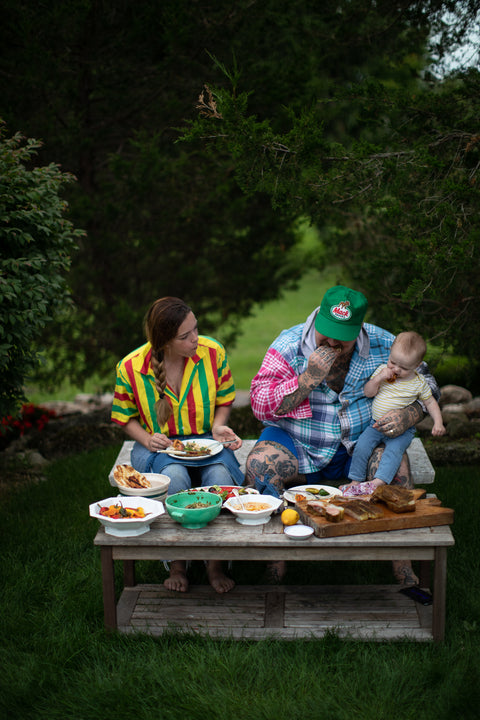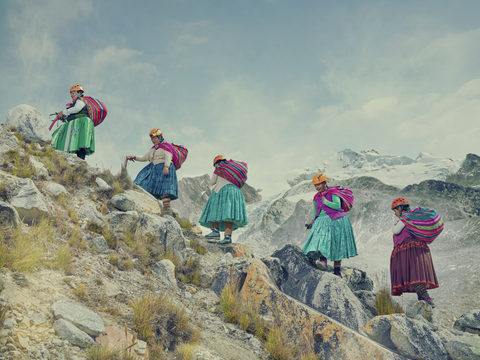Chef Matty Matheson’s first transformation took him from downtown party animal to internet celebrity. Now he’s working on his next act as a champion of regenerative agriculture.
TEXT: Mark Mann
Like everyone, Matty Matheson had a bad start to 2020. The celebrity chef—he really hates that term—had spent the previous year hosting food festivals, launching pop-up restaurants, and generally getting paid to be his loudest and most boisterous self. He estimates that he took nearly 200 flights in 2019 and spent only about 60 days at home. By December of that year, his schedule was already booked through to 2021, and he was getting ready to do it all over again. Then, shortly after he and his wife Trish discovered she was pregnant with their third child, the pandemic deleted all his plans.
”By mid-April, everything was gone. At that moment it was pure panic,” he tells me over the phone from the kitchen of his country home in Fort Erie, Ontario. Matheson approaches life with the voraciousness of a starving man: food, banter, cookbooks, Grateful Dead T-shirts, motorcycles. When he loves something he’s insatiable, and most of all, he loves to work. The prospect of stopping felt like an existential blow. “It's like, ‘Who am I? I'm just this fucking person that travels the world and gets paid to be a host at some barbecue festival?’ That has no sustainability. It's a facade. You know? And then all of a sudden, that hurts your ego.”
Matheson realized that despite his success, he was still living cheque to cheque, with a mortgage and a family to look after, along with a handful of employees who relied on him. “‘If I lay everybody off, then this is over,’ which scared me even more,” he recalls thinking. He realized he needed to quickly chart a different path, starting by getting back to his roots. “I was just like, ‘Okay, I'm not a celebrity chef, so let's go back to just being a chef.’ That's what I did, and once again, food gave me everything.”
Matheson turned his own kitchen into ground zero for a frenzy of projects. From the time that COVID-19 was declared a pandemic, he has launched two restaurants, a cookbook, a podcast, a line of cookware, and an upcoming clothing line. He has also produced and starred in over 100 YouTube videos. But of all those projects, the one that made the biggest difference in his life didn’t make him any money. Matty started a farm.
***
If you’ve yet to encounter Matty Matheson’s unfettered charm, here’s a brief rundown. For starters, he’s famously salty. Everything that comes out of his mouth is deep-brined in profanity, and while not exactly tenderizing, the effect is somehow reassuring. His sense of shame is inversely proportional to the number of tattoos that cover his body, as evidenced by his frequent nude toilet selfies. He dresses like every stage of human development compressed into one—toddler, teen, adult, and senior, all woven together into a single inimitable style. And his actual physical size is nearly as large as his personality. As he puts it, “I’m a big fat guy who yells a lot.”
A glance at Matheson’s profile might suggest a hipster Guy Fieri, but his fans know better. He first found fame six years ago on Viceland’s Munchies channel for his mysteriously non-threatening form of savagery. He could tell viewers that “a dull knife means you’re a fucking loser” and get millions of views. In his videos he offers the thrill of the friendly bully, making people nervous and happy at the same time. For Matheson, the formula is simple: “My job is I make people laugh through cooking.”
These days Matheson is impatient with being instantly associated with Vice, which he left in 2018 in order to go deeper into the world of his own creation, a space that has proven to be weirder, funnier, and ultimately much more big-hearted than his former network. In 2019 he launched his own YouTube show called Just a Dash, a “self-produced, self-directed, full Matty Matheson–conceptualized show” that’s so chaotic and hilarious, it’s easy to forget it’s a cooking show at all.
Once the first season of Just a Dash wrapped up at the beginning of 2019, Matheson embarked on his great big year of touring across the United States, Australia, and New Zealand. During this time, he wrote his second cookbook entirely on his phone (he got his first computer in 2020, a gift from Trish). His first, Matty Matheson: A Cookbook, traced his personal culinary journey and became a New York Times bestseller. In Home Style Cookery, his focus shifted from his own story to the way people really cook: not in some overheated downtown culinary scene, but in their own kitchens, for their family and friends.
Matheson drew inspiration from his return to Fort Erie, the town in southwestern Ontario where he grew up. Initially, it was skyrocketing prices that drove him from the city. “We just couldn't afford it,” he says. “I bought a 12-acre farm for the same price as a 500-square-foot condo in Toronto.” But once he landed in the country, his appreciation grew. “I'm looking at 150-foot-tall fucking Norwegian spruce trees swaying in the wind, covered in snow,” he tells me, looking out the window from his kitchen table. “It’s not glamorous, but it’s beautiful.”
Matheson’s writing is laden with the sort of good vibes that you might not expect to feel from someone who yells and cusses so much. His recipe notes brim with Matty-style affirmations, such as this one from his “Ricotta Egg Yolk Raviolo”: “OMG, this dish is perfect, and so are you.” And for a guy who’s best known for burgers, he does a lot of crooning over the merits of high-quality vegetables: “Imagine if we just actually left everything alone and ate things at the highs of seasons with no fuckery and enjoyed the real sensations of the purest love.” Right?
***
I got to know Matheson through mutual friends in 2014, shortly after he quit alcohol and drugs, and around the same time he was becoming famous. But even before he found a massive following online, Matheson was already a legendary figure in Toronto, in part for his jaw-dropping appetite for cocaine and whiskey, which led to a heart attack at age 29. Even then, it took another year of hard partying to reveal the extent of his addiction. With support from friends, he joined a 12-step program and has been sober ever since.
Six years later, when the pandemic snatched away his globe-trotting lifestyle, it was a lesson from recovery that helped him find his path forward. “One of the greatest things that I got from the [Narcotics Anonymous] program and getting clean is the ‘Just for Today’ thing,” he tells me. “If I can get through today and do the right things, tomorrow could be a little bit better from the actions that I take today.”
As his prospects evaporated, Matheson decided to turn his attention to his community in Fort Erie and his own backyard. In April he opened a small drive-through pop-up called Matty’s Meat and Three, which quickly became popular in the region and employed 25 people at its peak. He also reached out to his friend Keenan McVey to revive their plan to start a market garden on Matheson’s property, a scheme they’d been working on since autumn but that was starting to seem like another casualty of the pandemic.
McVey came from the same Toronto culinary world and had also moved to the same part of the Niagara Region. When he was doing the images for Home Style Cookery, Matheson invited McVey to come and help. One evening, they walked out behind Matheson’s house together and surveyed the big, four-acre lawn. “We were like, ‘Man, we gotta grow some vegetables,’” Matheson recalls. At first, it was a joke, but they quickly became serious. “At one moment it was like, ‘I need to do this, because if we don't do this now, I'm never gonna do it.’” Matheson turned to McVey and said, “Can you do this? Like, actually farm?” McVey said yes, and that was all Matheson needed to hear.
Back in his early twenties, McVey had taken a year off from cooking to work at various organic farms across Canada. In February, he supplemented that foundation with a two-week crash course in market gardening at Steadfast Farm, outside of Phoenix Arizona, where he learned practical techniques drawn from organic farming, permaculture, and regenerative agriculture. But when he got back to Canada, the first wave of the pandemic compelled them to cancel their plans. By April, however, Matheson had bounced back, and they were ordering seeds and equipment for a small, 3,000 sq. ft. plot that they hoped would at least feed their families.
Matheson’s accountant was dead set against it. “He wrote me a formal letter saying he strongly advised against me putting any type of money into something like this.” But Matheson didn’t want the farm to just be something they talked about. “Those things happen, and to really bring them back is very difficult for some fucking reason.” So he set aside the money to build a shed and a fence, buy a lot of compost, and pay McVey full-time hours.
They broke ground on May 24th and dubbed it Blue Goose Farm, after a restaurant Matheson’s grandfather had owned by the same name. Despite their modest ambitions, the garden produced abundantly, and before the summer was over, they were supplying three restaurants in the city. “They’re all restaurants that cook the way I like to grow, which is hyper-seasonal, hyper-local, small quantities with lots of diversity,” McVey told me. The two farmers were also able to stock up community fridges around Toronto with excess vegetables.
For Matheson, the farm was transformative. ”It gave me such a spiritual grounding that I've never felt, ever, and it was during the most stressful year of my life,” he says. He loved working with Keenan to replenish the soil and then feeding his kids high-quality vegetables grown under the best circumstances in his own backyard. Thinking about it, he slips into a sort of incantation: “Being able to walk out to that garden every morning and have a coffee and watch the sun rise and watch these vegetables grow and eat vegetables and harvest the vegetables and have a friendship that has grown into something very special with Keenan was a beautiful thing.”
After a year or two of living globally, the farm helped bring Matheson’s focus back to his own little corner of the planet. “We live in a world with so much information and so much social media, and all of a sudden it's our job to stop the rainforest from burning down and to fix the oil spills and to fix the government and to fix the world. I'm like, if everyone just did their part and started doing things on a very small level, I think it would create ripples on a very big scale.
“I don't want to change the world,” he tells me. “I want to grow enough vegetables to go to some food banks. And I want to take care of employees and have enough money to pay my bills. I don't need everything. It may seem like I'm trying to do everything, but I'm just doing what I'm doing because I like doing it, and that's enough for me.




